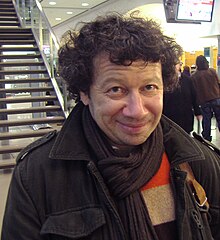Alexei Maximowitsch Parschikov
Alexei Maximowitsch Parschtschikow , also Parshchikov , born Alexei Maximowitsch Reiderman , ( Russian Алексей Максимович Парщиков , maiden name Рейдерман ; born May 24, 1954 in Olga (Primorye) ; † April 3, 2009 was a Russian poet and literature in Cologne .
Life
Alexei Maximowitsch's father was the military doctor Max Issaakowitsch Reiderman from Kiev , who was sent to an army department in China because of the so-called medical conspiracy from the aspirant to the Far East and stayed there until his son was born. His mother was the surgeon Lidija Samuilovna Parshchikova. After the father was demobilized , the family returned to Kiev. In 1961 the family moved to Donetsk because of the transfer of their father , so that Alexei Maximovich graduated from secondary school there. His first poems were written here . In 1971 he took the name Parshchikov. In 1972 he married Olga Lvovna Sviblowa (in 1983 they had their son Timofei, who became a photographer and poet).
Parschikov first studied at the Kiev Agricultural Academy and worked as an agricultural scientist for two years . He then studied in Moscow at the Maxim Gorky Literature Institute with degree in 1981. There he had with Alexander Eremenko and Ivan Zhdanov to Konstantin Kedrov connected, a circle for new poetry formed. In the 1980s Parshchikov belonged to an unofficial group of poets whose works were later summarized under the term metarealism at the suggestion of Michail Epstein . The authors who appeared together and who mutually analyzed and criticized their works included Alexander Jerjomenko, Ivan Zhdanov, Arkady Dragomoschtschenko , Rafael Levchin , Yuri Proskuryakov , Vladimir Aristov , Sergei Soloviev and Ilya Kutik . Konstantin Kedrow called the new poetry a metaphor for the epoch of Albert Einstein's theory of relativity . Parshchikov's first poem was published in 1984 with an afterword by Konstantin Kedrov about the metametaphor Parshchikov. Parschikov has performed at poetry festivals in the USSR , in European countries and in North America. His poems have been widely translated and have appeared in particular in Yiddish (by Lev Berinski ), Danish , English , Chinese , German , Dutch , Serbian , Uzbek (by Muhammad Salih ), Finnish , French and Japanese . Parshchikov himself translated works by Muhammad Salih from Uzbek and Lev Berinski from Yiddish, as well as other works from English and German. In 1987 he received the Andrei Bely Prize.
In 1991 Parschikov traveled to San Francisco in the United States . There he had a second marriage with the Swiss poet Martina Hügli eim (1991-1995). At Stanford University in the Slavic Department he graduated in 1993 with the work of Dmitry Alexandrovich Prigov's poetry in Russian conceptualism as a Master of Arts .
In 1995 Parschtschikow moved to his parents in Cologne , who settled there in 1995. He now worked in the Amsterdam cultural center ARTTRA together with Lyudmila Viktorovna Chodynskaya . In 1998 Parshchikov's correspondence with the poet Vyacheslav Kuritsyn appeared . In 2004 he presented his joint project with Igor Ganikowskij . In 2005 he was awarded at the Moscow Poets Biennial in the literary legend category. In 2006 an anthology of his poetry and prose was published in the Russki Gulliwer series .
Parshchikov married the journalist Ekaterina Drobjasko for the third time , with whom he had a son Matwei in 2006.
Parschtschikow died in 2009 at the age of 54 and was buried in Cologne's Melaten cemetery (lit. B, between lit. H + J).
Web links
- Literature by and about Alexei Maximowitsch Parschtschikow in the catalog of the German National Library
Individual evidence
- ↑ Spelling according to the tombstone
- ↑ a b Alexei Parshchikov (accessed August 19, 2017).
- ↑ a b Путь поэта (accessed August 19, 2017).
- ↑ Русские писатели XX века . Большая Российская Энциклопедия, Рандеву-АМ, Moscow 2000, p. 539 .
- ↑ a b c Cynthia Haven: Bard Without Borders (accessed August 19, 2017).
- ↑ a b Ольга Адрова: Метаметафора: как это было (accessed August 19, 2017).
- ↑ Парщиков, А. М .: Новогодние строчки . In: Литературная учёба . No. 1 , 1984.
- ↑ Jukka Mallinen : Метаметафора-как это было . In: НГ EX Libris . 2014.
- ↑ Игорь Шевелёв: РУССКИЙ ПОЭТ НА РАНДЕВУ (accessed August 19, 2017).
- ↑ Соприкосновение пауз . Манеж, Moscow 2004.
- ↑ Парщиков, А. М .: Ангары . Наука, Moscow 2006.
| personal data | |
|---|---|
| SURNAME | Parschikov, Alexei Maximowitsch |
| ALTERNATIVE NAMES | Парщиков, Алексей Максимович (Russian); Reiderman, Alexei Maximowitsch (maiden name); Parshchikov, Alexei |
| BRIEF DESCRIPTION | Russian-Soviet poet |
| DATE OF BIRTH | May 24, 1954 |
| PLACE OF BIRTH | Olga (Primorye) |
| DATE OF DEATH | April 3, 2009 |
| Place of death | Cologne |

